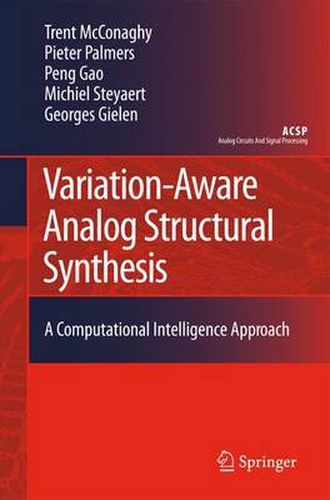Readings Newsletter
Become a Readings Member to make your shopping experience even easier.
Sign in or sign up for free!
You’re not far away from qualifying for FREE standard shipping within Australia
You’ve qualified for FREE standard shipping within Australia
The cart is loading…






This title is printed to order. This book may have been self-published. If so, we cannot guarantee the quality of the content. In the main most books will have gone through the editing process however some may not. We therefore suggest that you be aware of this before ordering this book. If in doubt check either the author or publisher’s details as we are unable to accept any returns unless they are faulty. Please contact us if you have any questions.
This book describes new tools for front end analog designers, starting with global variation-aware sizing, and extending to novel variation-aware topology design. The tools aid design through automation, but more importantly, they also aid designer insight through automation. We now describe four design tasks, each more general than the previous, and how this book contributes design aids and insight aids to each. The ?rst designer task targeted is global robust sizing. This task is supported by a design tool that does automated, globally reliable, variation-aware s- ing (SANGRIA),and an insight-aiding tool that extracts designer-interpretable whitebox models that relate sizings to circuit performance (CAFFEINE). SANGRIA searches on several levels of problem dif?culty simultaneously, from lower cheap-to-evaluate exploration layers to higher full-evaluation exploitation layers (structural homotopy). SANGRIAmakes maximal use of circuit simulations by performing scalable data mining on simulation results to choose new candidate designs. CAFFEINE accomplishes its task by tre- ing function induction as a tree-search problem. It constrains its tree search space via a canonical-functional-form grammar, and searches the space with grammatically constrained genetic programming. The second designer task is topology selection/topology design. Topology selection tools must consider a broad variety of topologies such that an app- priate topology is selected, must easily adapt to new semiconductor process nodes, and readily incorporate new topologies. Topology design tools must allow designers to creatively explore new topology ideas as rapidly as possible.
$9.00 standard shipping within Australia
FREE standard shipping within Australia for orders over $100.00
Express & International shipping calculated at checkout
This title is printed to order. This book may have been self-published. If so, we cannot guarantee the quality of the content. In the main most books will have gone through the editing process however some may not. We therefore suggest that you be aware of this before ordering this book. If in doubt check either the author or publisher’s details as we are unable to accept any returns unless they are faulty. Please contact us if you have any questions.
This book describes new tools for front end analog designers, starting with global variation-aware sizing, and extending to novel variation-aware topology design. The tools aid design through automation, but more importantly, they also aid designer insight through automation. We now describe four design tasks, each more general than the previous, and how this book contributes design aids and insight aids to each. The ?rst designer task targeted is global robust sizing. This task is supported by a design tool that does automated, globally reliable, variation-aware s- ing (SANGRIA),and an insight-aiding tool that extracts designer-interpretable whitebox models that relate sizings to circuit performance (CAFFEINE). SANGRIA searches on several levels of problem dif?culty simultaneously, from lower cheap-to-evaluate exploration layers to higher full-evaluation exploitation layers (structural homotopy). SANGRIAmakes maximal use of circuit simulations by performing scalable data mining on simulation results to choose new candidate designs. CAFFEINE accomplishes its task by tre- ing function induction as a tree-search problem. It constrains its tree search space via a canonical-functional-form grammar, and searches the space with grammatically constrained genetic programming. The second designer task is topology selection/topology design. Topology selection tools must consider a broad variety of topologies such that an app- priate topology is selected, must easily adapt to new semiconductor process nodes, and readily incorporate new topologies. Topology design tools must allow designers to creatively explore new topology ideas as rapidly as possible.